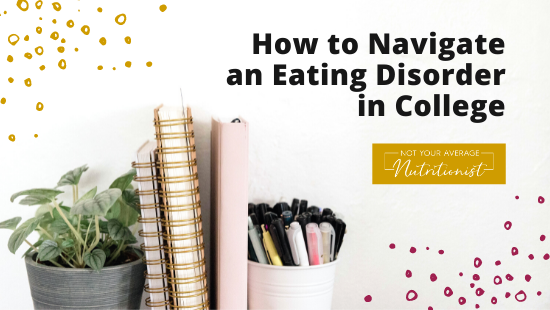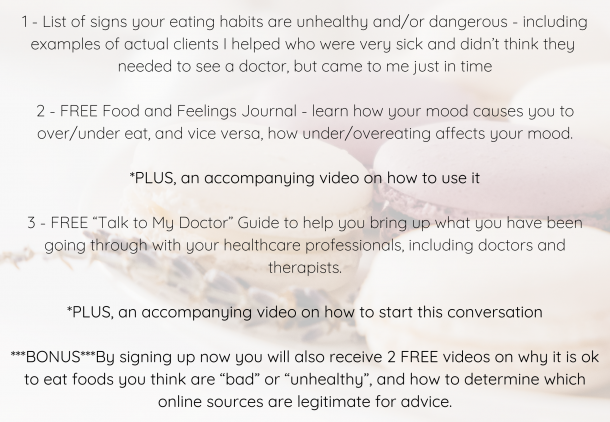How to Navigate an Eating Disorder in College
By Claire Pizzo
Claire is an intern at Not Your Average Nutritionist, who is passionate about healing people’s relationship with food and helping them find their own self-confidence. Claire is currently a dietetic intern at Long Beach State, pursuing her Registered Dietitian license.
College and eating disorders don’t mix very well. Not only is the transition from living at home to on your own very hard, having a complicated relationship with food makes it even more difficult. Having to make your own choices on when or what to eat can be daunting and even exacerbate your ED symptoms such as restriction, anxiety, purging, skipping meals, body dysmorphia, and feelings of shame and insecurity. These are all too common among those struggling with an ED in college, and you are not alone.
Whether you are a freshman just moving into your dorm or a seasoned student still trying to juggle your ED, we have tips and strategies to help you. Many of the tips we will discuss in this post are referenced from Libby’s book Permission to Eat: A practical guide to working yourself out of an eating disorder during college, while celebrating the awesomeness that is you!

Something that has been not only helpful, but a great bonding experience for sorority sisters, is a talk I give to chapters and schools called “Give Your Sister (and Yourself) Permission To Eat.” At this event we discuss how college life affects diet culture and disordered eating, how to notice if you are developing unhealthy habits, and how to help a friend who is struggling with their own eating disorder.
Even better, I have heard that this talk has opened up deeper conversations among members to talk about not only eating disorders, but mental health, and to talk more action in making a positive environment for members and their school at large.
Body Image and Peer Pressure
On a college campus, you are surrounded by students your age and many just want to fit in. It is challenging to be around those who have similar or are striving to be a certain body type (most likely thin, curvy, or “athletic”). Body dysmorphia, poor body image, and low self-confidence are unfortunately all too common among college students.
Dealing with body image is not a walk in the park, but it is a very helpful aspect in recovering from your ED. It is so important to check in with your own body without comparing each body part to other’s. Reframe your insecurities by practicing positive self talk. If there are particular parts of your body you are not fond of, try this: Instead of “I hate my arms” say “My arms help me write important papers and hug the people I love”. Instead of “My thighs are too big” say “My thighs and legs get me around campus and can hold my cute pets in my lap.” Your body does so many things that help keep you alive, and it is uniquely yours!
It is also important to surround yourself with body positive messages on social media by following friends who post about authentic real-life events, accounts that relate to your favorite hobbies, or educational accounts on subjects that interest you! Try to avoid accounts that regularly post pictures of touched up bodies and people.

Navigating the Cafeteria and Meal Times
Starting college comes with many new changes, including where you eat and how you eat. Instead of your kitchen table at home, you are probably grabbing dinner at your university’s cafeteria or dining hall. And with the new dining situation, you are in charge of what and where you eat, which can be a perfect opportunity for your ED to act up.
In Permission to eat, Libby explains the importance of mindful eating during your recovery journey. This is the practice of being present during your meal time by paying attention to the flavors, textures, and smells of your food. Mindful eating also incorporates being mindful of your emotions and thoughts, as well as paying attention to feeling full or hungry. Practicing mindful eating will help you enjoy your meals instead of dreading it. After all, food is key to fueling your brain during those long study sessions!
The key to fueling your busy body is a balanced meal, and you can use USDA’s MyPlate diagram for an idea of what a balanced plate looks like. Most dining hall options should have the foods your body needs to get through that college grind.
Another helpful tool is downloading The Food and Feelings Journal, which will help you keep track of eating patterns as well as the feelings and behaviors you do during your meal.
You can get the food and feelings journal, and how to use it, here.
And always remember STAY AWAY FROM DIETS! Studies show that more than 95% of the time they just don’t work (meaning you will regain the weight you lost, and then some) – and will only make your ED/health worse.

Over Exercising
Excessive exercise is a form of compensation commonly seen in those with EDs. Many who over exercise might feel they need to because of their peers doing it and triggering the compensation behaviors. You need to properly fuel for exercise with good amounts of carbohydrates, protein, and fats depending on the type of physical activity. Long term restriction while exercising can lead to dangerous situations such as: Increased risk of sudden cardiac death, amenorrhea, female athlete triad, fainting, bone fractures and breaks.
First, you need to understand why you feel the need to over exercise. Is it because of peer pressure? Is it to obtain that “perfect body”? Or is it a way to cope with your ED? All of these questions will hopefully help you know the root cause and get the appropriate help you need.
Move your body with joy, not hate. Of course, getting regular exercise is good for your overall health, but how can we do it in a healthy way? Well, start by listing your favorite activities that include movement like dancing, gardening, swimming with friends, playing beach volleyball, walking your pets, anything that you truly enjoy doing and brings you joy! Exercise is meant for fun and taking care of your precious body and mental health. Exercise is not for when you are tired, sick, struggling with overexercise, or for purging behaviors.
NYAN & On Campus Resources
You do not have to face your ED alone, our team at NYAN wants to join you in your journey of recovery and building back self-confidence. We want you to have the best college experience stress and ED-free, and we know how to help. Please contact us at office@notyouraveragenutrionist or call/text 805-225-3027.
Also, check out your college’s mental health services on campus. Many college clinics should be able to treat different EDs, at least as a place to start.
If you are interested in having Libby come speak to your college group, contact us with more information to discuss rates and what she can offer.




